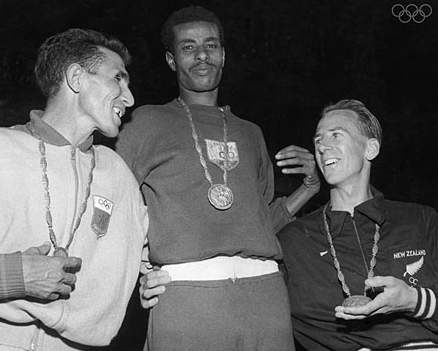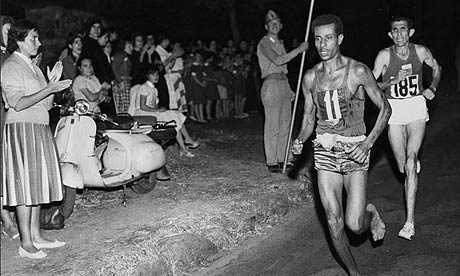Ethiopia: Abebe Bikila – A Flourishing Legacy

It was fifty years ago. September 10, 1960. An unknown Ethiopian runner dazzled the world that day by winning the gold medal in the marathon, the crowning sports event of the Olympic Games. History was made in Rome, Italy at a memorable occasion as the XVII Olympiad presented the world with an extraordinary gift: a young Ethiopian athlete by the name of Abebe Bikila. The first African to ever win an Olympic medal —let alone a gold in the marathon— Abebe Bikila became an instant legend as an awestruck world became mesmerized by the African who won the most difficult and celebrated global athletic event –without wearing shoes.
The astonishing victory and the circumstances surrounding it —no shoes, world record— captured everyone’s attention. Newspapers around the world carried the story. ―Barefoot Bikila First at Rome in Fastest Olympic Marathon,‖ declared the headline of an article published in The New York Times. The article’s first paragraph stated:
A skinny, barefooted palace guard in the Ethiopian Army of King Haile Selassie ran the fastest marathon in history tonight.
Africans and people of African descent in every part of the globe rejoiced. And citizens of the world, regardless of their national and ethnic origins, were short of words to express their admiration for the Ethiopian runner. The Times article continued:
A rank outsider who never had run the distance of 26 miles 385 yards outside his own country, 28-year-old Abebe Bikila won the classic race of the Olympic Games . . . .

Thinking about Abebe Bikila’s historic Olympic victory prompted me to re-visit Tim Judah’s Bikila: Ethiopia’s Barefoot Olympian. Judah’s book is a biographical work that uses many primary and secondary sources to tell the story of an unassuming young man who became a national hero and a world-famous athlete. The article in The New York Times that I quoted above is printed as a prelude to the subsequent chapters of the book.
The book makes several references to the published work of Tsige Abebe, the athlete’s daughter. Another Olympic legend, Mamo Wolde, is also mentioned in several passages of the book. It also gives a detailed account of the life of Onni Niskanen, the extraordinary Swedish man who was Abebe Bikila’s trainer. Several unique and striking photographs are included in the book as well. Most of the photographs, as the author acknowledged, came from Mr. Niskanen’s personal photo album which ―was left to Radda Barnen – Swedish Save the Children in Ethiopia.
It is important to note that the author pledged part of the proceeds from the sale of the book to Radda Barnen. Mr. Niskanen, according to the author, ―was at one point in his long and varied career the director of the charity in Addis Ababa. He advised the charity until his death in 1984.‖ Readers, no doubt, will find Mr. Niskanen’s background, his connection to Ethiopia, and his illustrious partnership with Abebe Bikila quite a captivating story.
Let us go back to that historic day in 1960 . . .
The race began at 5.30 in the afternoon of Saturday, September 10th. The weather was good, the sun shining and the sky brilliantly blue.
The two men who were representing Ethiopia, Abebe Bikila and Abebe Wakjira,
. . . were wearing orange shorts and green shirts. Bikila’s was emblazoned with 11, his number. They went unnoticed, especially as, being unknowns, they had not been ranked in the top 20 hopefuls by the experts.
The author goes on quoting an Austrian journalist who wrote, ―even if there had been half a dozen Abebes, no one would have paid particular attention. The Swedish trainer has said that they are first-class runners, but for most onlookers they are just two men with tongue-twisting names.‖ It was under such a heavy cloud of skepticism that the two Ethiopian athletes started the race. No one, except, perhaps, Coach Niskanen, anticipated a glorious victory from them. No one, indeed, knew that they were on a journey to establish a proud, colorful, and enduring legacy for their nation and continent.
Indeed, a new world record was set that day as Abebe Bikila came in first at 2 hours 15 minutes and 16.2 seconds, twenty-six seconds ahead of the second place finisher. Although he came in 7th, Abebe Wakjira’s role in the race must be equally admired as well. The two athletes made up the Ethiopian team and each did his part to secure victory.
Almost immediately after he had won, Bikila was examined by a doctor. He had only one word to say: “Fantastico!” Bikila’s pulse rate stood at a mere 88, his eyes were clear, he showed no signs of fatigue and there were no indications of bruising on his bare feet. He then told Niskanen that he could have kept going for another 10 to 15 kilometres at the same speed!
The book, certainly, contains ample snapshots of poignant moments. Although I, as a critical reader and, most importantly, as an Ethiopian, maintain some reservations on a few of the author’s assertions and attributed quotes, I still find the book worth reading. I also noticed that the book can use a little bit of editing. Moreover, if the publishers are considering a new edition of the book, I suggest the inclusion of an index. I highly commend the author for writing a valuable book about a subject and an athlete that are deeply embedded in the hearts and minds of Ethiopians, and many around the world.
Abebe Bikila’s trailblazing victory has become the foundation for Ethiopia’s global status as the home of many world-class long-distance runners. His legacy, as his name ―Abebe‖ implies, is a flourishing one.
I would like to conclude my tribute with a quote from the Preface of Mr. Judah’s book:
[Abebe Bikila] . . . became a legend in his own lifetime and a symbol for the new Africa in its years of decolonisation and hope. By the time of his tragic death in 1973, the continent’s dreams were shattered and Ethiopia was on the brink of famine, revolution, war and destruction.
Abebe Bikila, the pioneer Ethiopian Olympic hero, will always be remembered with sincere admiration and gratitude. The proud legacy that he bestowed upon us will continue to inspire generations to come.
By, Tewodros Abebe
Springfield, VA
September 2010

Many,many thanks to you,the sons of Ethiopia,Abai & Abebe.Even babies who were nurtured in the wombs of mothers were inspired by His being exemplary.Abebe is alive both in Heaven and on Earth.
This,eternal son of Ethiopia,Abebe elegantly ran in the streets of Rome and won the Olympic,Gold Medale;then,a new Rome was evolved, a new marthon champion record.
The heavenly secret was kept only to God and to Abebe.
The sun got up early in the morning and was in her way through the skies under the guidance of angels to the place where she destined to.God said let there be a light there was light;then,the new Africa was rebirthed.Abai,
What a man!
On that day,September 10,1960,Rome was a red carpet for the champ,Abebe Bikila.What a man!!
What a legend, Ethiopian athletes should wear green top and orange short when ever they run marathons at Olympic Games for his honor.